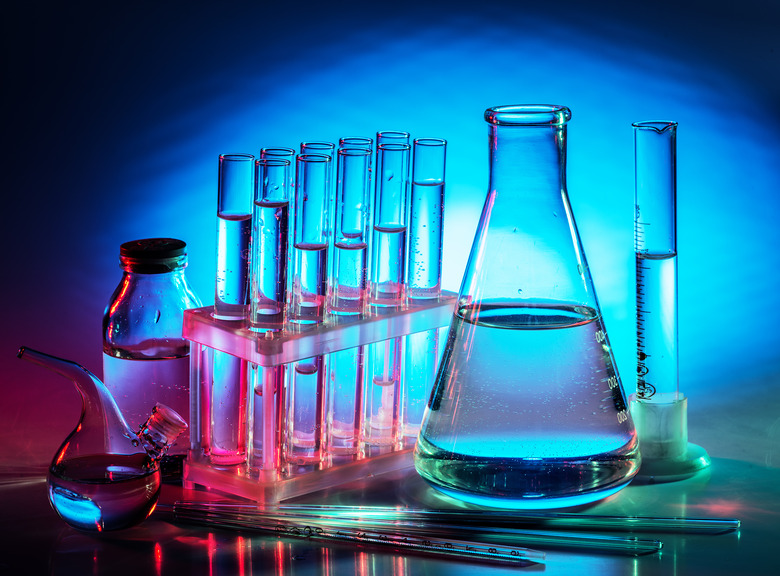How Does Concentration Affect The Rate Of Reaction?
Increasing the concentration of reactants generally increases the rate of reaction because more of the reacting molecules or ions are present to form the reaction products. This is especially true when concentrations are low and few molecules or ions are reacting. When concentrations are already high, a limit is often reached where increasing the concentration has little effect on the rate of reaction. When several reactants are involved, increasing the concentration of one of them may not affect the rate of reaction if not enough of the other reactants is available. Overall, concentration is only one factor influencing the rate of reaction, and the relationship is usually not simple or linear.
TL;DR (Too Long; Didn't Read)
The rate of reaction in general varies directly with changes in the concentration of the reactants. When the concentration of all the reactants increases, more molecules or ions interact to form new compounds, and the rate of reaction increases. When the concentration of a reactant decreases, there are fewer of that molecule or ion present, and the rate of reaction decreases. In special cases such as for high concentrations, for catalytic reactions or for a single reactant, changing the concentration of reactants may not affect the rate of reaction.
How the Rate of Reaction Changes
How the Rate of Reaction Changes
In a typical chemical reaction, several substances react to form new products. The substances may be brought together as gases, liquids or in solution, and how much of each reactant is present affects how fast the reaction proceeds. Often there is more than enough of one reactant, and the rate of the reaction depends on the other reactants present. Sometimes the rate of reaction can depend on the concentration of all the reactants, and sometimes catalysts are present and help determine the speed of the reaction. Depending on the specific situation, changing the concentration of one reactant may have no effect.
For example, in the reaction between magnesium and hydrochloric acid, the magnesium is introduced as a solid while the hydrochloric acid is in solution. Typically the acid reacts with magnesium atoms from the metal, and as the metal is eaten away, the reaction proceeds. When more hydrochloric acid is in solution and the concentration is higher, more hydrochloric acid ions eat away at the metal and the reaction speeds up.
Similarly, when calcium carbonate reacts with hydrochloric acid, increasing the concentration of the acid speeds up the rate of reaction as long as enough calcium carbonate is present. The calcium carbonate is a white powder that mixes with water but does not dissolve. As it reacts with the hydrochloric acid, it forms soluble calcium chloride and carbon dioxide is given off. Increasing the concentration of calcium carbonate when there is already a lot in the solution will have no effect on the rate of reaction.
Sometimes a reaction depends on catalysts to proceed. In that case, changing the concentration of the catalyst can speed up or slow down the reaction. For example, enzymes speed up biological reactions, and their concentration affects the rate of reaction. On the other hand, if the enzyme is already fully used, changing the concentration of the other materials will have no effect.
How to Determine the Rate of Reaction
How to Determine the Rate of Reaction
The chemical reaction uses up the reactants and creates reaction products. As a result, the rate of reaction can be determined by measuring how quickly reactants are consumed or how much reaction product is created. Depending on the reaction, it is usually easiest to measure one of the most accessible and easily observed substances.
For example, in the reaction of magnesium and hydrochloric acid above, the reaction produces hydrogen that can be collected and measured. For the reaction of calcium carbonate and hydrochloric acid to produce carbon dioxide and calcium chloride, the carbon dioxide can be collected as well. An easier method might be to weigh the reaction container to determine how much carbon dioxide has been given off. Measuring the speed of a chemical reaction in this way can determine whether changing the concentration of one of the reactants has changed the rate of reaction for the particular process.
Cite This Article
MLA
Markgraf, Bert. "How Does Concentration Affect The Rate Of Reaction?" sciencing.com, https://www.sciencing.com/how-does-concentration-affect-the-rate-of-reaction-13712168/. 12 May 2018.
APA
Markgraf, Bert. (2018, May 12). How Does Concentration Affect The Rate Of Reaction?. sciencing.com. Retrieved from https://www.sciencing.com/how-does-concentration-affect-the-rate-of-reaction-13712168/
Chicago
Markgraf, Bert. How Does Concentration Affect The Rate Of Reaction? last modified August 30, 2022. https://www.sciencing.com/how-does-concentration-affect-the-rate-of-reaction-13712168/
